
May a latest US prison court docket case involving digital property buying and selling be useful to Coinbase in its protection in opposition to the SEC? Final week, Avraham Eisenberg was convicted in a groundbreaking case on digital asset commodities fraud for manipulating Mango Markets to illicitly withdraw $110 million.
On October 11, 2022, Eisenberg manipulated the worth of futures contracts, inflicting a surge of 1,300% in simply 20 minutes, finally permitting him to “borrow” $110 million in cryptocurrencies in opposition to inflated property, as Bloomberg reported. The federal jury in New York discovered him responsible of commodities fraud, commodities manipulation, and wire fraud.
Eisenberg, described by prosecutors as an “utilized sport theorist,” utilized a false id to execute trades that considerably elevated the worth of MNGO tokens and their corresponding futures contracts. His protection claimed that his buying and selling actions had been authorized below the principles supplied by the decentralized finance platform, which is run by a wise contract system cautioning customers to function at their very own threat.
A smoking gun in Coinbase vs SEC?
The conviction of Eisenberg for commodities fraud, moderately than securities fraud, may probably be leveraged by Coinbase in its protection in opposition to the SEC’s lawsuit. Because the case highlights the shortage of clear regulatory steering from the SEC on the classification of digital property, Coinbase may proceed to argue that the regulator has failed to offer ample course to the trade, leaving crypto tasks and exchanges to navigate a murky regulatory panorama on their very own.
Furthermore, the truth that Eisenberg was prosecuted below commodities legal guidelines means that some digital property, just like the MNGO token, could fall below the jurisdiction of the Commodity Futures Buying and selling Fee (CFTC) moderately than the SEC. Coinbase may use this as proof to problem the SEC’s assertion of broad authority over the crypto house and the particular tokens listed in its criticism in opposition to the trade.
By drawing parallels between the MNGO token and the varied digital property that the SEC alleges are unregistered securities traded on its platform, Coinbase could contend that if MNGO was handled as a commodity in Eisenberg’s case, the identical logic ought to apply to the tokens singled out by the SEC.
Moreover, Coinbase may argue that the SEC has been inconsistent and arbitrary in its therapy of digital property, as evidenced by Eisenberg’s conviction for commodities fraud moderately than securities fraud. The trade could assert that the regulator has not supplied a transparent, predictable framework for figuring out which tokens represent securities, resulting in an uneven taking part in discipline and selective enforcement.
Lastly, Coinbase may use the Eisenberg case to reiterate its calls for the SEC to interact in clear rulemaking and supply express steering on how current securities legal guidelines apply to digital property. The trade could argue that with out such readability, the trade will proceed to face uncertainty and the danger of arbitrary enforcement actions.
Murky waters of US digital asset laws
Whereas the Eisenberg conviction supplies potential avenues for Coinbase to problem the SEC’s lawsuit, the precise info and circumstances of every case differ. The court docket will finally have to judge the deserves of Coinbase’s arguments and the SEC’s allegations primarily based on the distinctive traits of the tokens in query and the relevant authorized frameworks.
On January 20, 2023, the SEC charged Eisenberg within the Southern District of New York with violating anti-fraud and market manipulation provisions of the securities legal guidelines in relation to his actions on the Mango Markets platform. Nonetheless, there was no replace to the SEC web site relating to the progress of the case, whereas the CFTC’s case has gone to trial. Whereas Eisenberg’s futures manipulation would come below the purview of the CFTC, the SEC has beforehand laid declare to digital asset tokens akin to MNGO, corresponding to within the criticism in opposition to Coinbase.
The case in opposition to Eisenberg is unlikely to type an ironclad authorized precedent for use by Coinbase in court docket, but it actually reinforces the declare that US regulatory enforcement of crypto lacks readability and neutrality. Nonetheless, some points of the case, together with the event of the CFTC’s case in comparison with the SEC, could properly come to mild as part of Coinbase’s protection showcasing the inconsistencies in US crypto regulation.
Finally, the commodities fraud verdict in opposition to Eisenberg provides one other layer of complexity to the continued debate over the right regulatory therapy of digital property and will provide Coinbase extra ammunition in its authorized battle with the SEC.
